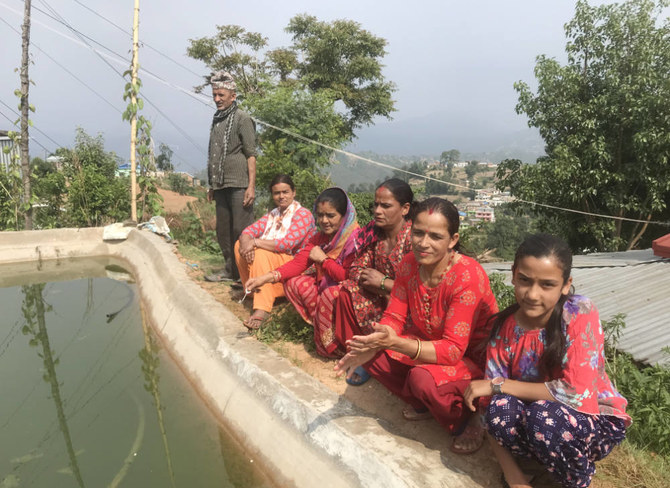Water scarcity in Kuinkel Thumka, a mountainous village in eastern Nepal, has for years made life difficult for residents — until a few months ago when they started to capture excess rainfall during the monsoon season.
Located in the Middle Hills, between the Himalayas and Tarai, the village of 850 people lies in Kavrepalanchok district of Bagmati province, where the International Center for Integrated Mountain Development (ICIMOD), has introduced soil-cement ponds to store rain and runoff water.
“We built a soil-cement tank in our village eight months ago and started to collect rain,” Gita Kuinkel, a 53-year-old farmer, told Arab News.
“Before this tank, we didn’t have enough water and our lives were hard. It was not enough for our cattle, household chores, and irrigation. Now, the water is enough,” she said.
“We don’t have to buy vegetables, we grow and eat vegetables from our own home gardens.”
Cheap soil-cement conservation ponds are constructed in the region with the help of ICIMOD, an intergovernmental research center serving countries of the Hindu Kush Himalayan region, and the Center for Environmental and Agricultural Policy Research, Extension and Development (CEAPRED), a leading Nepali developmental NGO.
The ponds capture excess rainfall during the monsoon, making water available during prolonged dry periods, which in recent years have been more frequent, even in the Himalayas, as South Asia is experiencing unprecedented heat waves due to climate change.
Sanjeev Bhuchar, a water management expert at ICIMOD, told Arab News that more than 80 percent of Nepal’s 13 million population was dependent on mountain springs as the primary source of water. But the springs are drying up.
“In Nepal and other Himalaya-Hindu Kush countries, depletion of springs is one of the major emerging water crises,” he said.
“There is increasing evidence that spring discharge is decreasing, or in some cases, ceasing altogether.”
For the latest International News Follow BOL News on Google News. Read more on Latest International News on oldsite.bolnews.com

















